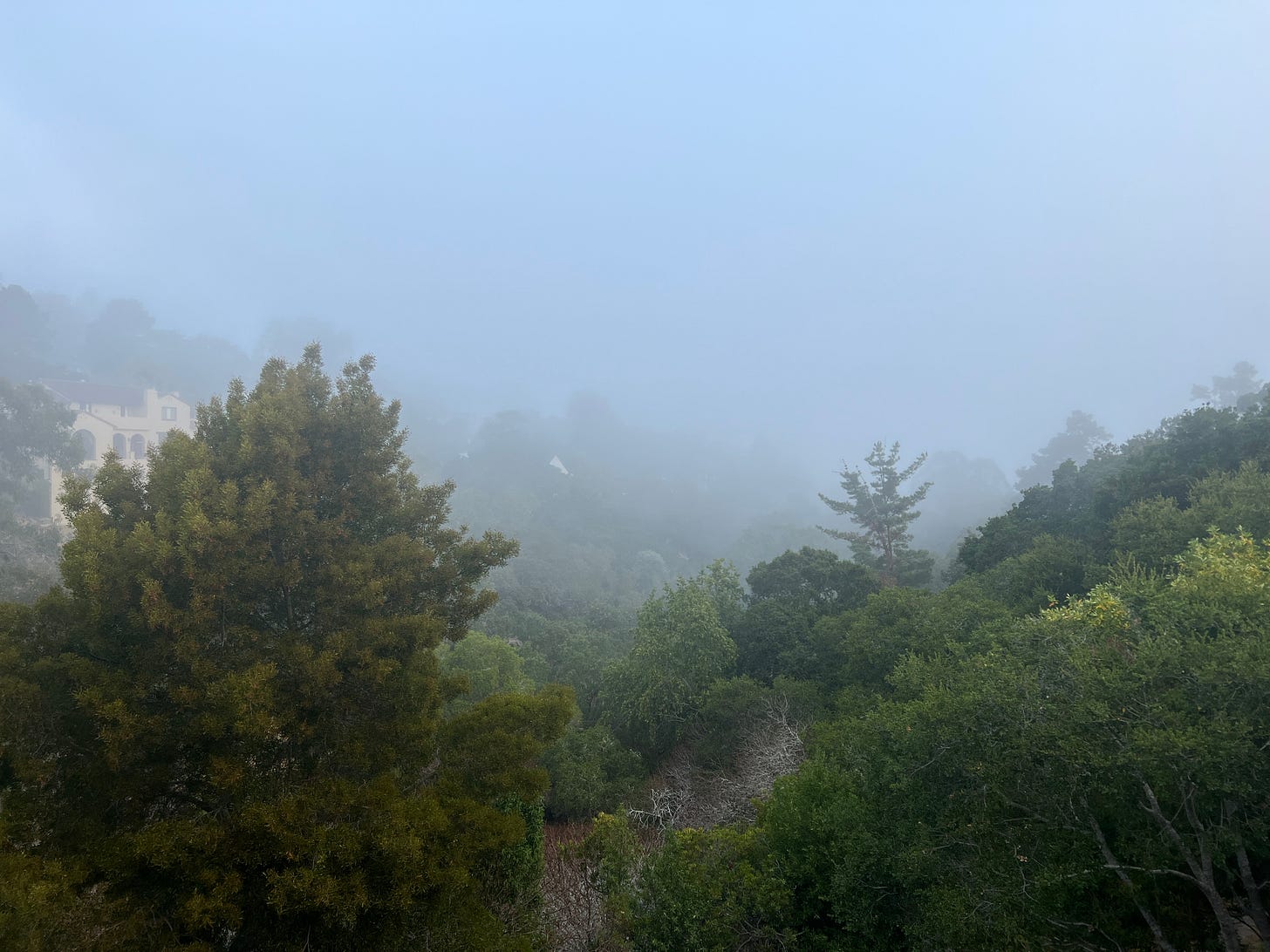Love from Fogland
A Brief Dispatch on Books, Beauty, and Intimacies
This is just a brief dispatch, written in the morning, as I sit in bed with my coffee, watching the fog move over the canyon. Fog is my favorite thing about the San Francisco Bay Area. We used to live in San Francisco’s outer avenues, just a few blocks from Ocean Beach, and the fog blanketed our small back yard every morning, obscuring the view down the hills and out to the Pacific. My son’s third word, after “mama” and “dada,” was “fog.” It was a fact of our lives then—the air we breathed and walked through so cool and damp, smelling of the ocean.
Now, we live a few miles south of the city, ten miles inland. Most mornings, I can look out my window and see the fog bank over San Francisco, a solid-looking mass of white, but the fog rarely makes it over the hills into our canyon. When it does, it’s a treat. Fog makes everything quieter. It has a lovely smell. It provides relief from drought; you can almost see the trees in the canyon drinking it up.
The world is a mess right now. Over the past week, beginning with the brutal attacks on Israeli civilians on October 7th, many of whom are still being held hostage by terrorists, and now the heartbreaking humanitarian crisis in Gaza, we are witnessing tremendous suffering. It can sometimes seem untoward to continue our everyday routines—working, writing, watching the fog, drinking coffee. But I believe that in the worst times it is acceptable to embrace art and literature and beauty, food and even humor—the things that affirm life.
At the moment I am reading a wonderful book, Intimacies by Katie Kitamura. I started reading it a couple of weeks ago and set it aside, but returned to it when I realized that my days had been so taken up with teaching and work and daily tasks that I hadn’t picked up a book in what felt like ages. The book is told from the point of view of a young woman on assignment in The Hague, tasked with serving as interpreter for a man who is on trial for heinous war crimes. It is a story about violence, but the violence is observed from afar. The writing is controlled, almost cautious, anchored by the speaker’s daily life with lover and friends.
Kitamura writes of the strange state of living in a place where you speak the language only marginally.
At first I moved in a cloud of unknowing, the speech around me impenetrable, but it quickly grew less elusive as I began to understand single words and then phrases and now even snippets of conversation. On occasion, I found myself stumbling into situations more intimate than I would have liked, the city was no longer the innocent place it had been when I arrived.
This made me think of my experience of living in France, where I, too “moved in a cloud of unknowing.” The opaqueness of the language served almost as a cocoon; though I was often confused during interactions, I was able to write in public for the first time in my life. When the conversations around me were background noise, it was easy to tune them out and write through them—similar to the experience of writing with instrumental music in the background. But as time progressed and my ear adjusted to the language, I would find myself caught up in strangers’ narratives, focusing on words and sentences, trying to parse the pieces to understand the whole.
It is a fact of being alive in the world that, no matter how much we try to learn the language and the lay of the land, we are at a loss. Books and music and film help us see outward, while also turning us inward. It is a privilege to read and to write. I hope that during this week, you will give yourself a few minutes, or a few hours, with a wonderful book.
Foggy reading: If you have fond memories of San Francisco, you might find something to love in Cool Gray City of Love:49 Views of San Francisco, by Gary Kamiya. Once upon a time I wrote a novel inspired by the fog. It’s called The Year of Fog; it’s a book about a child who goes missing on San Francisco’s Ocean Beach, and it’s a book about memory, and it will always be dear to my heart. You can get the book here, and you can peruse my foggy playlist here.
Thank you for reading Novella with Michelle Richmond. You are receiving this newsletter because you signed up at some point in the past on my author website, through Random House, or via Substack.




I loved Intimacies by Kitamura. Such an unusual book.
Your piece on fog is a pleasure to read.
Your message that with all that happened October 7th, we should be engaging in life affirming activities is so welcome right at the moment. Hopefully enough positive outpopulates so much negative (like how probiotics work) which hopefully might bring some sort of positive resolution. Media seems not to be running messages like yours so you are filling in the vacuum of what they should be posting.